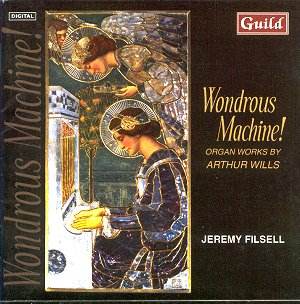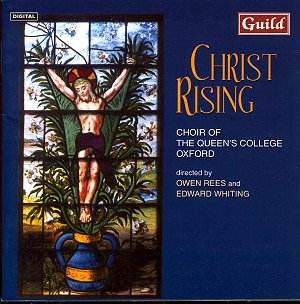 Composer: Arthur Wills (born 1926)
Composer: Arthur Wills (born 1926)
Works: WONDROUS MACHINE! Organ works
Performers: Jeremy Filsell (organ)
Recorded: Tonbridge School Chapel, October 2000
Label: Guild Music GMCD 7225
Duration: 77:37
Arthur Wills, a name that resonates with the rich tapestry of British organ music, is celebrated not only for his role as a choirmaster and educator but also for his distinctive compositional voice. This new recording, Wondrous Machine!, presents a compelling anthology of Wills’ organ works, primarily composed over the last two decades, alongside earlier pieces that showcase his evolving mastery of the instrument.
The disc opens with Carillon on “Orientibus Partibus” (1976), a piece that serves as an exuberant introduction to Wills’ organistic oeuvre. Here, Filsell’s interpretation is vibrant and spirited, encapsulating the piece’s lively character. The work, based on a tune known as “The Song of the Ass,” unfolds with a rhythmic buoyancy that sets a jubilant tone for the listener. Filsell’s command of the instrument is evident, as he navigates the intricate counterpoint with aplomb, delivering a performance that is both precise and exuberant.
Following this, the Song without Words (1994), subtitled “In Memoriam Sergei Rachmaninov,” emerges as a poignant reflection. The work’s delicate lyricism, crafted in a restrained manner, evokes a deep emotional resonance, paying homage to Rachmaninov’s expressive style without resorting to pastiche. Filsell’s nuanced touch here is particularly noteworthy; he manages to convey the introspective qualities of the piece, allowing the lyrical lines to unfold with natural grace, reminiscent of Rachmaninov’s own melodic sensibilities.
The Prelude and Fugue “Alkmaar” (1971) showcases Wills’ ingenuity in the traditional form. Filsell’s interpretation emphasizes the contrasting textures and moods, from the stately opening of the Prelude to the exuberant counterpoint of the Fugue. The clarity of articulation in the fast runs is commendable, as is the way Filsell shapes the thematic material, allowing the listener to appreciate Wills’ sophisticated harmonic language.
Equally engaging is the Scherzo-Fantasy “The Ely Imps” (1994), which portrays a delightful whimsy. The performance here is characterized by a buoyant playfulness, with Filsell deftly capturing the “impish” spirit of the music. This piece, rooted in the plainchant tradition, cleverly amalgamates historical references with a modern sensibility, demonstrating Wills’ ability to traverse musical epochs with ease.
The title work, Wondrous Machine!, stands as a highlight of the collection. Subtitled “A Young Person’s Guide to the Organ,” it is a vivid exploration of the organ’s vast capabilities. The work follows a model reminiscent of Britten’s variations, yet Wills’ thematic material, derived from Purcell’s Hail, Bright Cecilia, breathes new life into the concept. Each variation is a testament to Wills’ inventive spirit, showcasing a kaleidoscope of colors—from the sprightly Rag, which nods to the jazz influences of the 20th century, to the imposing final Fugue, which brings the piece to a majestic close.
Recorded in the resonant setting of Tonbridge School Chapel, the engineering captures the organ’s full sonic palette. The clarity of the individual voices in the polyphonic textures and the warmth of the instrument’s tone are commendable, allowing listeners to experience the music’s full dimensionality.
Historically, Wills’ contributions to the organ repertoire are significant, particularly in his ability to fuse traditional forms with contemporary idioms. His works are deserving of wider recognition, particularly pieces like Variations on a Carol (1965), which explore the organ’s coloristic potential while maintaining a thematic cohesion that is often elusive in modern compositions.
In conclusion, this recording of Arthur Wills’ organ works, brilliantly interpreted by Jeremy Filsell, not only highlights the composer’s technical prowess and inventiveness but also serves as an engaging introduction for those unfamiliar with Wills’ music. The careful selection of pieces presents a vivid portrait of his stylistic evolution and mastery of the organ, ensuring that Wondrous Machine! is a significant addition to the contemporary organ repertoire. For both organ aficionados and newcomers alike, this collection is a revelatory experience that promises to enlighten and entertain.
